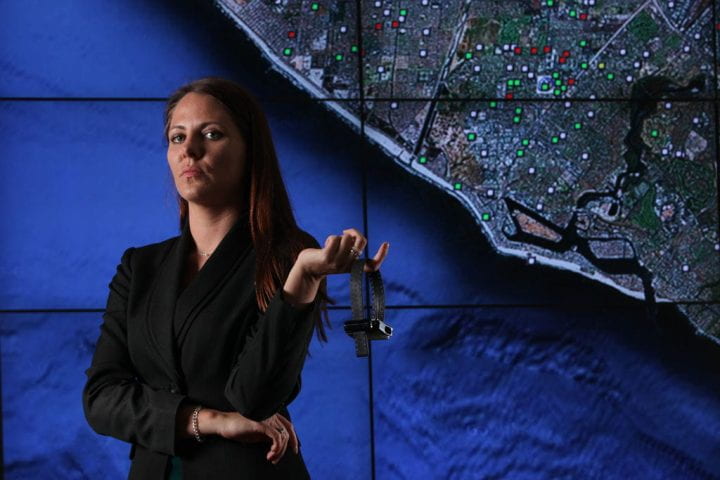Assessing the state's sex offender policies
Public Impact Fellowship helps doctoral student Emily Troshynski explore costs, benefits of GPS tracking.

Emily Troshynski grew up on half a dozen Indian reservations in the Midwest. She attended college first in Minnesota, then London and, for the past five years, Irvine – making Southern California her steadiest home base yet.
“My parents worked for the Indian Health Service – my dad as a pharmacist and my mom as a nurse,” explains Troshynski, the oldest of four children. “I learned to bloom where I was planted, wherever that might be.”
She believes her transient childhood prepared her well for the variables of academia. “It’s given me a sense of being secure in a global community,” she says. “I’m able to go anywhere in the world, meet interesting people and feel comfortable.”
Troshynski will soon move on yet again. This summer, after completing a doctorate through UC Irvine’s Department of Criminology, Law & Society, she’ll head for Des Moines, Iowa, to teach at Drake University.
Winning a $10,000 Public Impact Fellowship has helped speed her return to the Midwest – not that she was in a huge hurry. “I’m going to miss all the wonderful people here,” Troshynski says. “I owe so much to my mentors and to the collaborative nature of the program.”
Established by Graduate Division Dean Frances Leslie, the prestigious award supports UCI grad students whose work shows promise of significantly benefiting society. Over the past school year, it has freed up Troshynski to concentrate on her dissertation.
“I was living paycheck to paycheck as a teaching assistant,” she says. “Twenty hours a week of ‘TAing’ is a lot of time. Thanks to the fellowship, I’ve been able to put those 20 hours toward research and writing – and now I can graduate on time.”
Prior to her panel interview for the fellowship, Troshynski nervously prepared a PowerPoint presentation, a poster and other visuals. “Then I decided, ‘Forget all that – I’m just going to go there and have a conversation about why my research is important,’” she recalls. “That was so much fun – and good practice for job interviews.”
Troshynski’s dissertation is on the effectiveness of surveillance technology in the criminal justice system. In 2006, California voters passed Jessica’s Law, which mandates that all convicted sex offenders, including juveniles, be tracked by GPS for the rest of their lives.
The statute also bars sex offenders from living or working within 2,000 feet of schools or other places populated by children. “Its language is vague: ‘where children frequent,’” Troshynski notes. “Each municipality can decide what that means. In some cases, parolees cannot, for instance, attend AA meetings at a church with a day care center.”
For her research, she interviewed 48 sex offenders about life under surveillance. “Many of them were homeless,” Troshynski says. “Wearing an ankle bracelet does not facilitate rehabilitation. Studies show that while the number of transient parolees has increased, recidivism remains the same.”
Her dissertation also addresses the expense of using GPS devices – $35 a day per sex offender. “The law has good intentions,” she says, “but we need to understand its long-term social and economic price.”
Troshynski holds a bachelor’s degree in political science and sociology from the University of St. Thomas, in St. Paul, Minn., as well as a master’s in sociology from the London School of Economics & Political Science. During her stint at UCI, she also completed a graduate emphasis in feminist studies.
UCI criminology, law & society professor Elliott Currie calls her dissertation work “one of the first efforts to assess the impact of these policies on both the lives of the offenders and the operation of the parole system itself.”
“Emily is a formidably talented researcher and a creative, innovative and passionately committed young scholar,” he says. “Her impressive energies seem powered by a genuine excitement about the intellectual and moral issues in her field.”


